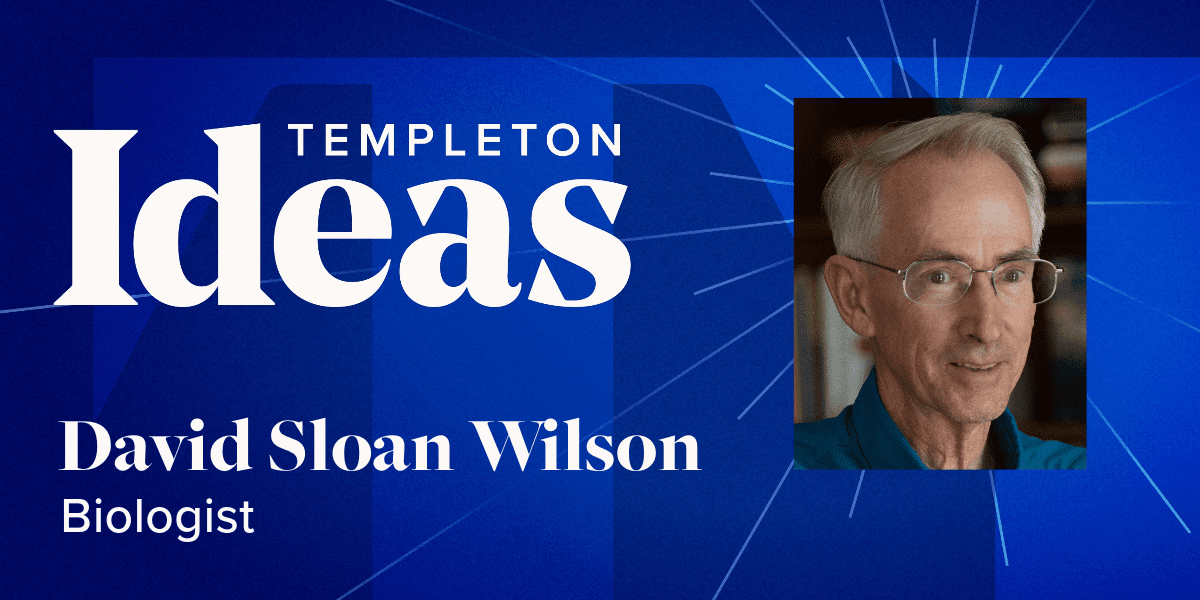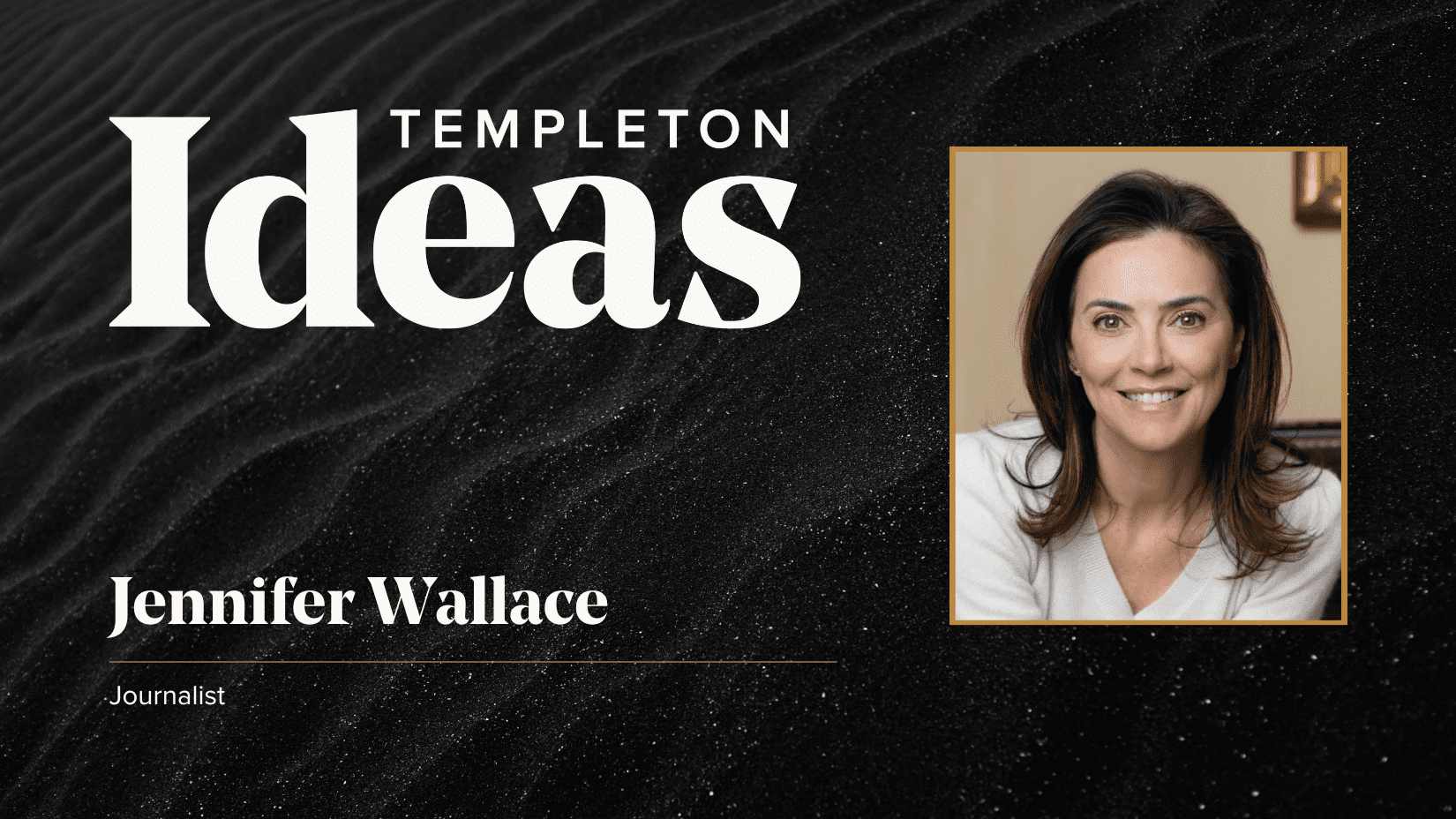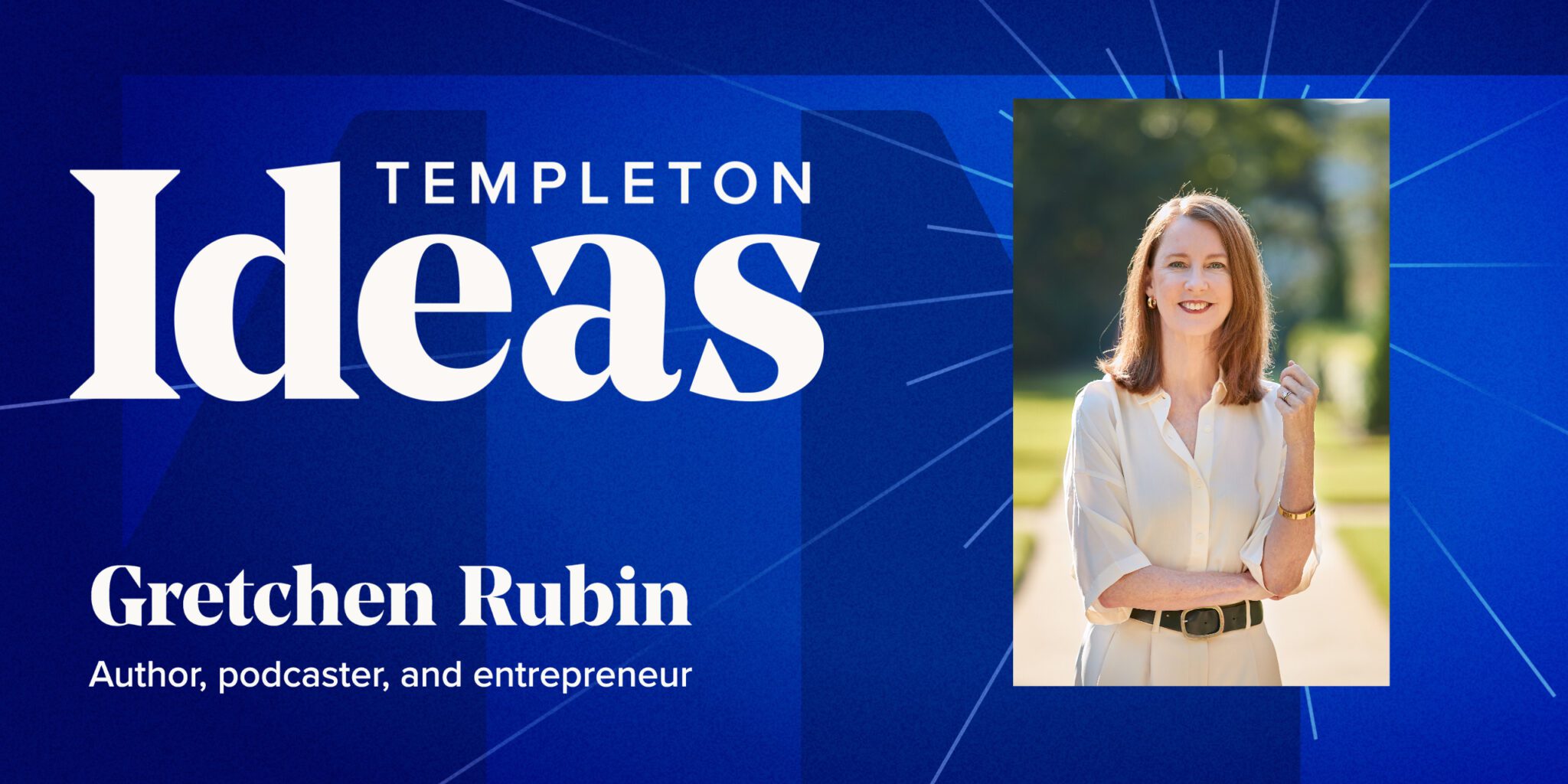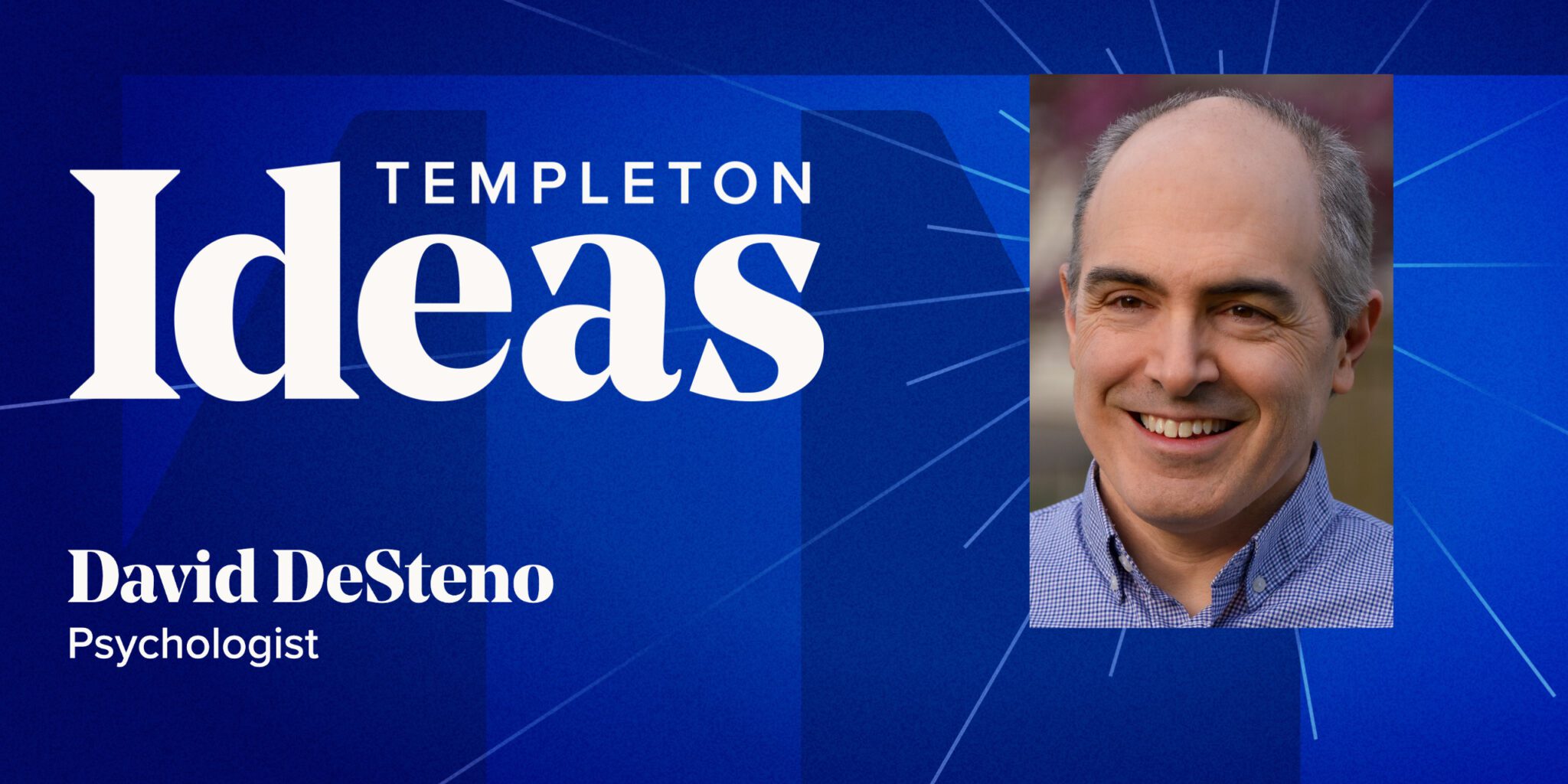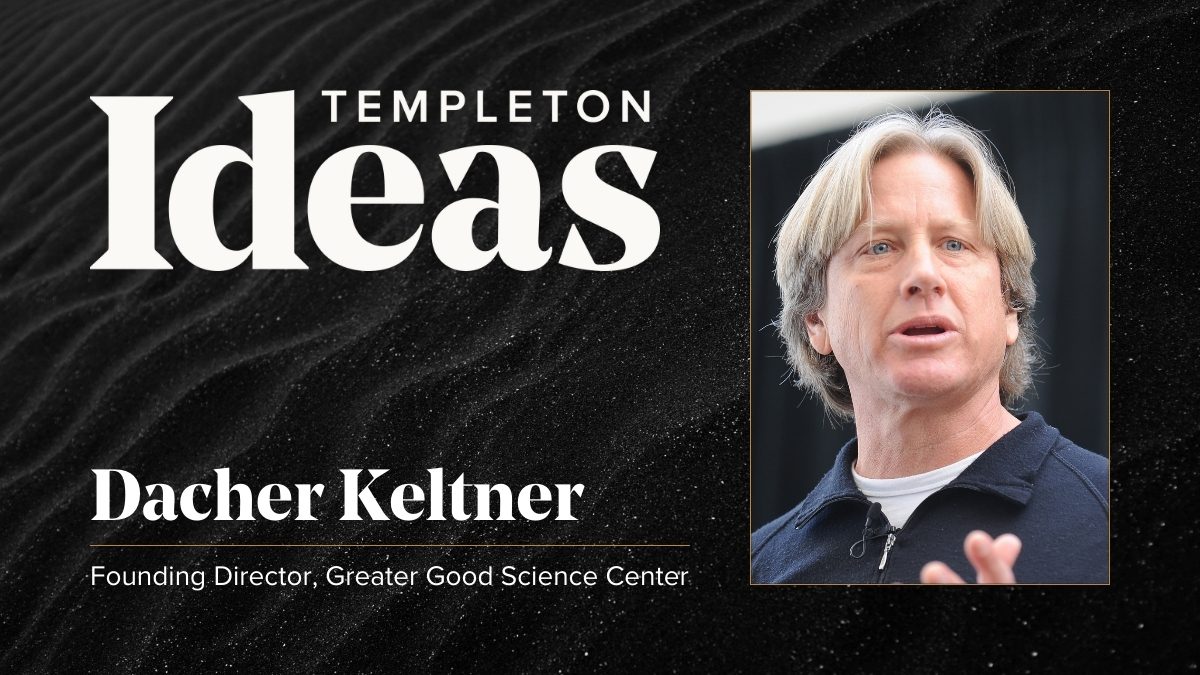The Templeton Ideas Podcast is a show about the most awe-inspiring ideas in our world and the people who investigate them.
Transcripts of our episodes are made available as soon as possible. They are not fully edited for grammar or spelling.
Dr. David Sloan Wilson is an evolutionary biologist and professor emeritus at Binghamton University. During his career, David started the Evolutionary Studies program at Binghamton to unify diverse disciplines under the theory of evolution. He also co-founded the Evolution Institute, advanced multilevel selection theory, and is a prominent proponent of group selection in evolution. David joins the podcast to discuss the theory of group selection, the advantages of ultra-social “super organisms,” and why it’s important to create an alignment between the way that we think about spirituality intellectually and the way we feel it experientially.
Tom: I’d like to open up by asking, tell me about where you spent your summers as a child and how you spent your time.
David: I spent my summers in the most magical place. My family owned an old hotel. Adirondack Hotel on the north end of Lake George. And the hotel was decommissioned shortly after World War II, but the grounds, about 600 acres, and a collection of cottages remained, and so it remained a kind of a cottage club.
And every summer, I and my two siblings, my family, would move up into Lake George, and we would spend two months on about a mile of shoreline. And oh my golly, it was just paradise for a small kid.
Tom: Let me follow up on that because I was wondering, to what degree your early schooling, primary and secondary education fueled your interest and desire to become a scientist and to what degree was it the other aspects of your life that set your heart on fire for the path that you took?
David: So, my dad was a famous novelist, and that’s a big factor in my life.
Sons of famous parents are a study in their own right. To be the son of a famous parent, you can’t help but compare yourself to them. And it can go different ways, but in my case, I respected him, I wanted to do something as noteworthy. But I had to escape his shadow, and so that’s one reason why I became a scientist, although I remain, I retained a kind of a novelistic sense of wanting to understand the human condition.
And his marriage to my mother was not very happy, that’s reflected in his novels. And they moved around a lot when I was a kid, so I never took roots in any of my hometowns, and my only, the only continuity was that summer place I was talking about. And then I was sent to a boarding school in the Adirondacks, deep in the Adirondacks, called the North Country School, which was the best thing that could ever happen to me.
And that’s where my connection with nature deepened. So my other life was so disconnected, I have little memory of it. Isn’t that odd that I remember very little? Except for my summers in Lake George and then, at the age of 11, going to, uh, this wonderful boarding school.
Tom: Yeah, memory can be very selective. Probably for our own best interests.
David: Yes, not as if my life was traumatic or anything, anything like that. And so, uh, I think I’m an empath in nature. I think that’s going to come up again in terms of how other-oriented you are. And my mom, I don’t remember it myself, said that I was following her around saying, I’m sorry, I’m sorry.
And she thought this, this is not healthy. I have to send him away.
Tom: Let me take us in a direction closer to your area of, of emphasis and expertise. I’m going to ask about group selection, evolutionary theory. In my casual reading of evolutionary biology over the years, I’ve noticed that concepts like altruism, generosity, cooperation, are often considered enigmas that demand an explanation, but a concept like selfishness is taken for granted as a default and doesn’t, doesn’t really need an explanation necessarily.
Tom: Why do you think that is? That some concepts just have to be justified and other ones can maybe be a default, this is the way we’d expect it to be.
David: Well, I’ll give two answers to that, that question. One is, we’ve, we’ve experienced 70 years of individualism and reductionism, and so the idea that we need to reduce everything social to something that’s individual leads to the view that, uh, that altruism is some kind of self-interest.
That, uh, anything that appears other-oriented actually must be for the benefit of the individual in some, in some way. And that’s, um, an intellectual tradition that has extended across the board. So it’s economics, my field of evolution, the social sciences, so reductionism and individualism. It was preceded by a more holistic view.
The idea of society as an organism, of course, has an ancient pedigree, especially in religion. So I think that’s a general trend. But on top of that, it is the case that selfishness is more easy to explain than altruism from an evolutionary perspective. Because if natural selection is all about individuals surviving and reproducing better than other individuals, isn’t that selfishness?
And if an individual helps other individuals survive and reproduce at its own expense, then how can that evolve? That’s a genuine puzzle. And the puzzle has a solution, which is: groups of altruists cannot compete in groups of individuals who can’t cohere. So evolution does provide a way to explain altruism. But the two combined, the, the, the puzzle of altruism, which does have a solution, and this reductionistic trend, uh, really ended up in this mentality that everything is selfish and, and to call something altruistic, there’s something that’s wrong with that.
Tom: All of your books deal with the topic of group selection in more than half of your published academic articles. Can you explain for those who are unfamiliar with the term what group selection is and perhaps give some examples too that illustrate it?
David: First let me make the point that evolution is all about relative fitness. It doesn’t matter how well you survive and reproduce in absolute terms, only in comparison with others in your vicinity. And based on that relative metric, then you cannot really explain altruism on the basis of what takes place within a single group. On the contrary, what takes place within a single group is weighing in favor of selfishness.
But you can if natural selection operates at the group level. In other words, there’s a population of groups, that vary in how altruistic they are, and the more altruistic ones are going to beat the less altruistic ones. So that’s the theory of group selection in a nutshell. And one way I often explain it is with a game of Monopoly.
So the single game of Monopoly is a competition among individuals within a single group. And there’s very little scope for cooperation. If you’re playing the game of Monopoly, you, you, you turn off your cooperation. If you imagine a Monopoly tournament, where the trophy goes to the team that develops their real estate the fastest, all of a sudden it’s all about cooperation, and it’s in teamwork mode. There’s no way that you can beat your fellow player. And so there is the difference between within group competition and between group competition in a nutshell.
It’s not at all hard to understand.
Tom: From, from what I’ve read, over the course of the 20th century of, of evolution biology, group selection has been viewed with a great deal of suspicion and sometimes doubt, downright dismissal. In, in the time and over the arc of your career of studying group selection, how has the reception of group selection among your peers changed, if at all?
David: Well, as you say, uh, and when I entered graduate school, it was, uh, the rejection of group selection was at its, was at its height. And I was attracted to it in part because I did want to make a name for myself. being ambitious, thanks to my famous, uh, famous dad. But I think things have changed tremendously over the years, and now I think group selection is very largely accepted by the experts, and especially in the case of our own species.
The bottom line is, we are a highly group selected species. Cooperation is the signature adaptation of our species. Almost everything special about us as a species is one form of cooperation or another. And it’s amazing when you look back. You know, 30 or 40 years ago, people were beginning to try to explain human evolution from an evolutionary perspective, and they had also rejected group selection.
So they were trying to explain human evolution in an individualistic way, and it just won’t work. So, just about everyone, I think, that seriously concerns themselves with the topic is accepting of the idea that we are a highly group selected species, and that cultural evolution, which of course is the most important form of evolution that’s taking place all around us, is very much a multilevel process.
Tom: I think one of the things that’s remarkable about you is your range of studies, uh, the breadth of, of your curiosity. I think even within biology, the number of different species you’ve studied. I wonder you, I think you mentioned humans as one example, but are there certain species that you think have helped push the conception of biology towards group selection.
David: What we can say is that in most social species are a mosaic of traits. Some evolved by group selection and they’re cooperative. Others evolved by within group selection. And they’re selfish. And an important lesson to learn is that evolution does not make everything nice. Evolution often results in outcomes that benefit me, not you, selfishness, us, not them, another kind of selfishness, and now, not later, short term not long term. And so there’s examples, many examples, in nature of animal societies that we would never want to live in. They’re as bad as the worst despotic societies, human societies, you can imagine. Now, in the few species, they become cooperative in almost all respects. And there we have the honeybees and the ants and the termites and the naked mole rats.
And they become so cooperative that we call them super organisms, we call them ultrasocial. And they are, they literally have become a higher-level organism. And, of course, that’s what we want for humans. That’s what we need for humans, and so that’s what we need to do. And, uh, some human superorganisms exist at a small scale, or even a medium scale, but it has to happen at the global scale.
And so the whole project of a conscious cultural evolution is to bring what we sometimes call Gaia. The whole earth has a, the noosphere is another, is another term, the whole idea of cooperation at the worldwide scale on behalf of all species in the planet, not just, not just humans. That’s like the grand project that we need to be working towards and it is not easy, but it is possible. We have the conceptual tools for it.
Tom: After the break, I asked David about evolutionary theory’s real world applications, and how it shaped his own personal and spiritual journey. Also, spoiler alert, I ask him about his experience meeting the Dalai Lama.
Abby: You’re listening to the Templeton Ideas podcast from the John Templeton Foundation. If you’re enjoying this episode, check out templeton.org/news for more awe-inspiring perspectives from scholars, journalists, and colleagues. You can sign up there to get our newsletter in your inbox or follow us wherever you are on social media. Now let’s get back to our conversation.
Tom: Can you tell me a specific anecdote? I’m curious about your involvement in a school district in the city in which you lived and which you worked to implement some of these design principles into the school setting and how it played out there.
David: So, uh, up until about 2006, I was just a professor studying this kind of thing. And then at that time, I decided, golly, I want to do this out in the world. And I made friends with the school superintendent, and the first thing we did before we got to the school was, thanks to her, we gave a survey to all of the public school students, grades 6 through 12, to measure their degree of pro-sociality.
How pro social are you, at least in your own mind? And then we tested a prediction. Which is that if pro-sociality is going to survive as a, as a Darwinian strategy, those who give must get. Those who give must get. If you’re giving, giving, giving, and you’re not getting anything in return, you will disappear before long.
Your behavior will… Disappear. So there needs to be a correlation between the pro sociality of the individual and the pro sociality of the social support that they’re getting. So against that background, I had the opportunity to design a school for at-risk students, students who had flunked two or more of their courses the previous year.
And it was an opportunity to create our own social environment in which we built in these core design principles. Can we find a separate facility? Can we give it prestige so that you might be proud to belong to this uh, school. What can we do to, to give the students some decisions, some say in what they do during the, the school day?
Of course, we need to monitor their behavior. And if they’re not behaving as they should, then we need to do something about it which is compassionate. Starts out nice and friendly and only escalates when necessary. And let’s praise them for good behavior in addition to criticizing them for… Bad behavior.
If conflicts occur, let’s just flag it early and do something about it. So on and so forth. And so we did the best we could. We didn’t actually teach these principles to the students. We created a social environment that they just walked into. And what we found was that they bloomed, they blossomed. And this was in a randomized control trial.
So we had a comparison group, students just like them, that were experiencing the normal school routine. And we showed amazing improvements. And not only that, but these improvements happened in a few weeks.
Tom: Pivot back to your, the personal journey that you’ve been on and how your research and studies have influenced the way that you, you see yourself. I, I wonder, and to ask you directly, how, how have your wide -ranging studies, both your high level academic studies and then as well as civic engagement, how have those changed to transform you as a, as a person?
David: Well, going outside of the Ivy Tower, and I still have one foot in the ivory tower. I still write academic articles and so on. And it’s actually an important message that I have for the Templeton Foundations, in addition to in general, is that the best basic scientific research takes place in real world settings.
It’s one of the messages of evolution. You cannot understand anything about a species except in the context of the environment in which that species evolved. And if the species current environment is different than its past environment, we call that mismatch. And so we have to understand that too. So, studying species in the context of their past and present environment is the only way to do it.
And laboratory experiments only make sense against that background. But with human research, it’s seldom like that, but it needs to be. And so we need to be studying people in the context of their everyday lives. And if we’re doing that, then we can improve their lives at the same time that we’re studying their lives.
So I use the word study and steward. Study basic scientific research, steward, actually assisting in positive change efforts to be in real world situations. And frankly, personally, I’m not, I’m a shy person. It might not seem like it, but I am. And, and so it’s not easy for me to go and, you know, meet new people and, and, and things like that.
David: But it is by far the most gratifying thing I’ve done is to develop this study and steward paradigm in my, um, and work. And what I learn… by applying this in the real world, it’s just so much more informative about the questions that I ask as a, as a scientist. And so I’m quite passionate about this idea that we should be, we should be using our science in the real world, and we should be making the world a better place, and we can.
And so, uh, that’s become my whole life. I’m retired, but I work as hard as I ever did. Few of my non-profit organization, Pro-Social World, with many projects around the world to basically consciously evolve a world that works for all. That’s our mission. Let us consciously evolve a world that works for all.
Tom: I read that you had an opportunity to meet the Dalai Lama several years ago. I know from a little bit that I know that he’s very enthusiastic about science. I’m wondering, how did that conversation go with him? What surprised you? How did it affect you?
David: Well, it was an amazing experience. It was organized by the Mind and Life Institute, which has organized scientific events for His Holiness for a long time.
Typically, there were conferences that he would attend, but now, in part because of his age, they organized one-hour conversations with a single person, and I was honored to have one of those conversations. Since then, I became involved with the second most famous Buddhist master, Thich Nhat Hanh, who passed away a couple years ago, but his monastery, Plum Village in France, we started a collaboration with them.
And just recently, I’ve published a print conversation with one of their senior monks named Brother Phap Linh. on the theme of spirituality, science, and action. Three key words. How do they go together? That was the theme that I spoke with His Holiness, but in the space of an hour, what can you do? But in this conversation with Brother Phap Linh, we go the distance.
And so I highly recommend, if you’ll provide this in the liner notes. And to compare a wisdom tradition such as Buddhism with a scientific tradition such as multilevel selection is so very fascinating.
Tom: You’ve written that your, your studies and your life experiences have made you more spiritual yourself as a person. Tell me what that, what that means to you and what that consists of.
David: Right, so, in many ways, I’m a highly intellectual person, and although I’ve been studying spirituality and religions as an academic subject, but thanks to others, including Kurt Johnson, who’s a wonderful man who also is trained in evolutionary biology, but also is fully ordained episcopal monk and, and truly exist in both worlds. I’ve begun to basically to just, just to experience spirituality for myself and to become more heartfelt, you might, you might say, and to become easier at calling myself a spiritual, a spiritual person, to engage in spiritual practices and to see the meaning of ritual and, and, and so on.
Tom: There’s many scientists. Perhaps many evolution biologists have a knee jerk reaction, a hostility to things that smack of religion or spirituality. If you had a minute to, to make your case of why might one want to consider some of the benefits or value of spirituality, what might you tell some of your colleagues?
David: Well, so here’s, here’s a whole little piece. Darwin knew nothing about genes. And so he thought very broadly about evolution in terms of any form of heredity. But with the onset of genetics in the early 20th century, the study of evolution became highly gene-centric, as if the only way that offspring can resemble their parents is by sharing the same genes.
David: And also, the modern synthesis held that there’s, evolution has no purpose whatsoever, no consciousness, organisms simply vary, the only selection is the immediate environment, and so all sorts of things became purged from the study of evolution, which had to await… ensuing decades in order to come back in with a study of group selection and cultural evolution.
David: But now we can say, knowing that humans are a highly group-selected species, that in some ways spirituality, what we talk about with spirituality and with words such as sacred and worship or things like that, it’s the psychological state of being part of something larger than yourself. That when you’re really functioning in group selection mode, your psychology has become so other-oriented that you have now placed the group above yourself, and the whole language of spirituality and religion comes into this. And so spirituality then becomes, and religion, becomes very natural and something that we should strive for. If we’re going to be in a group, then why shouldn’t we shed our individual mindset and develop a mindset where we operate as part of something larger than, than ourselves? And so this brings, uh, spirituality inside the orbit of evolutionary theory and by explaining it scientifically does not dilute it as far as the experience is concerned.
I think very, very often when I’m dealing with spiritual people, there’s this distinction between the heart and the head, and there’s the idea that, you know, science can only apprehend a little bit of this, that there’s some things that are beyond sciences, has to be heartfelt and so on, but I regard my own mission for myself and others is to create an alignment so that the way that we think about it intellectually is so much aligned with the way we feel it experientially, that there’s not a dissonance. There has been a dissonance in the past. Science, if, if by science we mean scientific materialism, that’s, that’s one thing. But if by science we mean ultimate causation, to use a evolutionary term, and this is a part of my conversation with Brother Phap Linh, that made it a deep conversation, then the way we think about it intellectually, aligns with the way we experience it, and there’s no dissonance.
Wouldn’t that be good? So that’s what I think that we, we have in front of us.
Tom: So as we look towards the future and we aspire that we’re going to have a world, say, a century from now in which people, plants, other animals can flourish, that we can have some stability, that we can put some of our conflicts and troubles at bay.
Would you say spirituality has a part in becoming the kinds of people that are going to be thriving a hundred years from now?
David: Well, in a nutshell, and it’s hard to take something that big and put it in a nutshell, but I could make a very short series of statements. Number one, the primary social identity for everyone should be, I am a human being and citizen of the world.
The global identity should be the primal identity. In addition to that, we need to live in smaller groups, and those groups need to be appropriately organized, because that’s where we get all the fulfillment of, of life, is working together with other people on meaningful… Uh, so the, the smaller group is the cell of multicellular society.
And then all those middle level identities, all the way we regard ourselves, our religions, our nationalities, our ethnicities, our personalities, all these middle level identities do not go away. And in many cases, they should not go away. They should remain. Strong, but must be coordinated with the global good in mind.
And so it is multi-level. It’s not just global, it’s not just local. It’s multi-level and but coordinated with the welfare of the whole earth system in mind. So that makes it humans plus much more. So that is basically the goal.
Tom: David, I think that’s a great note to end on. Thanks for talking to me today.
Tom: Thanks to you.
Abby: You’ve been listening to Templeton Ideas from the John Templeton Foundation. Where we fund research and tell stories that inspire people with awe and wonder. We’re proud to support leading scientists, philosophers, and theologians from around the world. Learn about the latest discoveries related to black holes, complexity, forgiveness, and free will at templeton.org/news.
If you like what you’ve heard so far, follow us and leave us a review wherever you get your podcasts. Our program was produced by Jakob Lewis with Great Feelings Studios. Our theme song is by Dan Burns. Our staff includes Thomas Burnett, Abby Ponticello, Benjamin Carlson, David Nassar, and Alyssa Settefrati.
